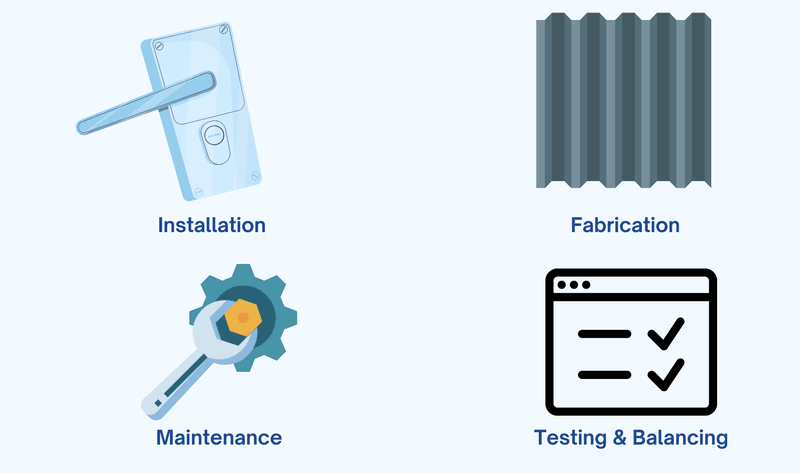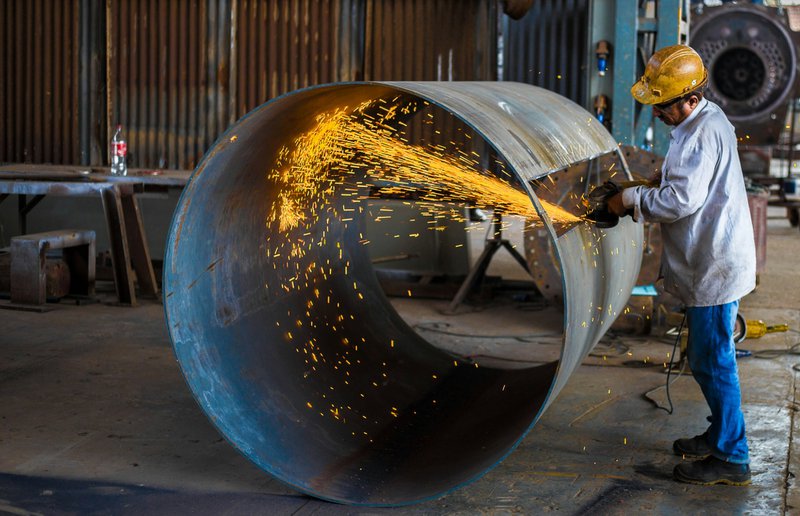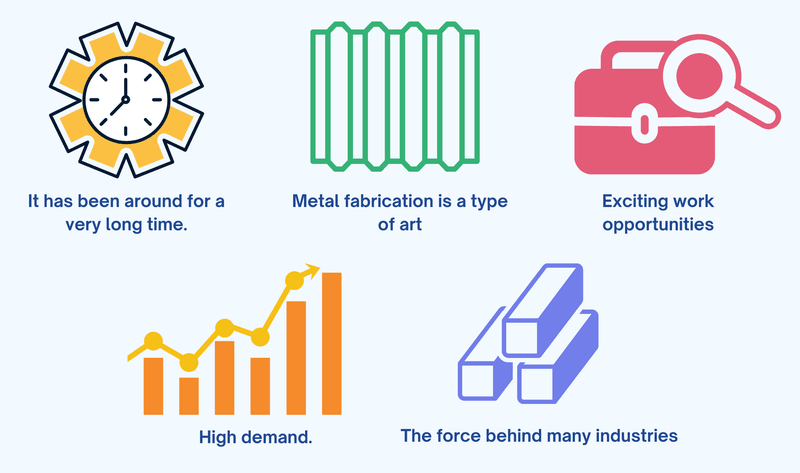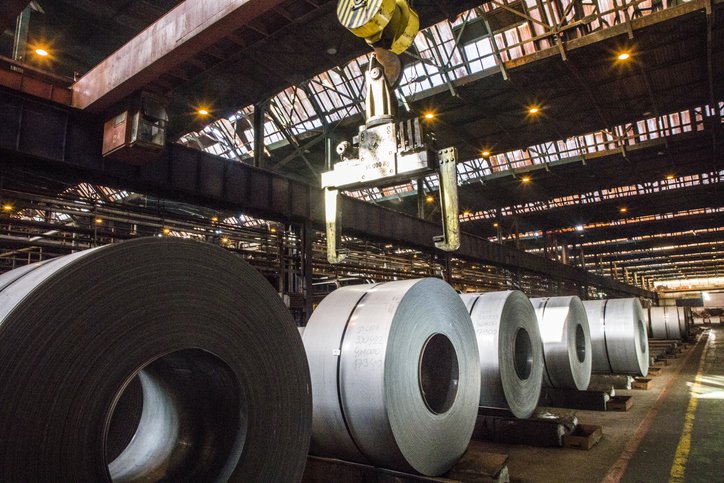The calendar pages continue to turn rapidly, and one question remains. This article will discuss the query: Is metal fabrication a good career path? – What career path to choose? Well, we at Totempool continue our quest to find the answer. So we bring you the best possible career options in our good career path series.
What Is Metal Fabrication?
Metal fabrication involves the cutting, bending, forming, and assembling of metals. Metal fabricators work on producing specialized components that can withstand extreme conditions. These components are typically used in medical devices and aerospace parts.
Several types of metal fabrication methods exist, such as stamping, cutting, folding, welding, etc. A metal fabricator manufactures the metal components of various objects that various industries use.
Many tasks in metal fabrication are automated today. However, there is still a wide range of intricate work done manually. Moreover, automation adds to the speed, accuracy, and efficiency of various processes in metal fabrication.
Responsibilities of a metal fabricator include:
- Studying blueprints of machinery
- Using hand tools and equipment to cut, join and fabricate metal objects.
- Conducting quality checks to ensure that all the parts comply with the various specifications
- Record the results and maintain a work log for every project.
Some light fabrication work would be on metal chairs, motor car bodies, or water tanks. The industry gives support and material to several other industries, such as auto manufacturing and construction. The manufacture of bridge structures, crane and ship structures, and wind towers would fall under the heavy fabrication category.
Sheet Metal Workers
Now that we know what metal fabrication is let us look at a few more aspects of this field before answering the question – Is metal fabrication a good career path?
In this section, we shall focus on sheet metal work. Workers in the sheet metal industry manufacture, install and recondition sheet metal products such as elements part of any heating, cooling, and ventilation systems.
Sheet metal workers specialize in one out of three aspects of sheet metal work – fabrication, maintenance, or installation. However, they know all three facets.
Factory workers perform repetitive tasks and lack the exposure to move on to more complex roles. A good level of safety training is required since the job involves a high risk of injury.
Categories of Sheet Metalworkers and their responsibilities
Broadly speaking, sheet metal workers have the following responsibilities:
- Making and installing different sheet metal products such as air and heat ducts. Some other products include sheet metal buildings and roofs.
- Measuring and preparing metal sheets for different jobs.
- Operating sophisticated tools that bend, straighten, or cut metal sheets with high precision.
- Polishing rough metal surfaces or the seams and joints between metal sheets
- Welding metal sheets together
- Understanding and applying work specifications.
However, there are sheet metal workers who carry out specialized duties. These include:

Installation sheet metal workers
These workers install sheet metal products such as heating, air conditioning, or ventilation ducts. Some other products that they install are metal roofs and gutters.
Fabrication sheet metal workers
These workers make precision sheet metal parts for different industries like medical devices, aerospace, and power generation. Their jobs can be highly automated, and the sheet metal workers then familiarize themselves with the software that controls sheet metal production and cutting.
Maintenance sheet metal workers
Here, the workers are entrusted with repairing the heating, ventilation, and air conditioning units. The workers fix the breaks and leaks and remove the moisture and dust to do this.
Testing and balancing sheet metal workers
They measure the airflow and adjust the metal sheets to ensure the heating, ventilation, and air conditioning units work correctly.
What Are The Skills and Qualifications Needed for a Career in Metal Fabrication?
Most entry-level jobs as metal fabricators require a high-school certificate or a GED. Additional qualifications that help are a college degree and certifications from a welding school.
Math in Metal Fabrication
Mathematics and the ability to make detailed measurements are integral to metal fabrication.
To become a metal fabricator, one needs to be proficient in mathematics. People skilled in this subject have a knack for solving problems and figuring things out. A tiny error or a minor misjudgment can prove very costly here.
How Do You Write A Resume For A Metal Fabrication Job?
Generally, metal fabrication consists of three processes:-
Design
Here a 3D prototype is created using Computer-Aided Design (CAD). The decision of the materials to be used is also taken at the design stage.
Fabrication
The parts are cut into the desired shape based on the design.
Assembly and Finishing
Assemblers and other workers of the fabrication team assemble the work and execute various finishing processes. These include the removal of excess material and the application of substances that enhance the object's appearance.
The Resume
As a metal fabricator, one could apply to roles involving any of the above aspects. Let us look at the different steps to writing a metal fabricator resume.
Prominently display name, title, and contact information:
Details such as name, title, and contact information should be clearly visible on one’s resume. This information should preferably be in bold and distinct fonts.
A Skills Section
This should be the area of focus after your personal details. The skills and core competencies you include in this section depend on the role one is applying for.
For instance, if one is applying for a machinist position, his skills would be machine operation, equipment maintenance, and troubleshooting. Whereas, for a welder, the core skills would be welding and reading blueprints.
Employment History:
An individual’s employment history must be there in his resume. Ideally, this must first state his latest/recent stint before covering his previous jobs. Each entry should include his job title, employer, period of employment, and responsibilities.
Education and Certifications:
The details in this section depend on the role one is applying to. For example, if one is using to be a welder, he can include the relevant certifications such as:
- Certified Welding Fabricator, issued by the American Welding Society
- Laser Welding Certificate, issued by the Fabricators & Manufacturers Association
- Precision Sheet Metal Operator, issued by the Fabricators & Manufacturers Association
Most employers look for a combination of a degree and hands-on experience.
Apart from the above steps, one should always revise his resume and compare it to the job description. The resume should also be ATS compliant.
Is Metal Fabrication A Good Career Path: Available Job Positions

This section will look at some of the job options available to metal fabricators. This will help us get a more precise answer: Is metal fabrication a good career path?
Fabricator
They create the metal components of machinery and equipment. Fabricators also cut, bend, shape, and file metal pieces — to meet the project specifications.
Moreover, they are responsible for selecting the right tools, such as drills, cutters, soldering irons, etc. They also review finished items for quality and consistency. Fabricators earn more than $40,000 a year on average.
Welder
A welder works on fusing two pieces of metal under extreme heat, utilizing either cut or join metal, smooth surfaces, or fill holes carried out on ships, bridges, and other similar large objects.
Welding is a labor-intensive task that demands a high level of physical fitness. Welders make around $43,000 a year.
Sheet Metal Mechanic
He is responsible for properly installing sheet metal equipment, especially for roofing, drainage pipes, ventilation ducts, and, air conditioning systems.
Additionally, he studies the blueprints of objects in detail and helps manufacture them as per exact measurements. A sheet metal mechanic makes close to $50,000 a year.
Millwright
A millwright operates machinery on a construction site or a manufacturing plant. He is also responsible for reviewing blueprints, preparing machine parts, fitting pieces into specific machines, and replacing defective ones. A millwright earns more than $56,000 in a year.
CNC Machinist
CNC stands for Computerized Numerical Control. Here CAD or CAM software writes the code on the controller. This code is written so that the CNC machine can read it. CNC machinists follow assembly instructions, load metal pieces into the CNC machine, and weld them together.
They are also responsible for performing a quality check on the finished products. Furthermore, they are tasked with maintaining the CNC machine after completing a production run. CNC machinists typically make more than $47,000 a year.
Boiler Maker
He is someone who oversees the assembly and installation of boilers. A boilermaker also assembles and installs large containers that carry gases and liquids.
They work closely with clients to design boilers that meet their requirements. Then these boilermakers set out to create boilers that work in intense temperatures and pressure conditions.
Boilermakers visit worksites to inspect the gauge on the boiler, make adjustments to the pipes and repair the metal body of the boiler if necessary. They make more than $60,000 a year.
Industrial Engineer
Industrial engineers look for the best ways to procure material, optimize schedules, train subordinates, and minimize waste.
They also focus on enhancing quality control methods. They assess manufacturing operations in industrial environments and develop efficient manufacturing systems.
Pros of a Career in Metal Fabrication

So, to completely answer the question – Is metal fabrication a good career path? let us look at some of the pros of a career in this field
It has been around for a very long time.
Metals are some of the oldest substances discovered by humans. The earliest species of man have engaged in some form of metal fabrication. The metals or alloys they created helped them create tools for hunting or farming. Even though millennia have passed, metals remain the driving force behind several major industries.
Metal fabrication is a type of art.
Working with different metals and molding them into desired shapes involves a creative bent of mind, and this is ideal for a person who does not want a monotonous desk job that consists of filling up Excel sheets.
Exciting work opportunities.
Metal fabrication is a field that is full of diverse opportunities. This is helpful as it provides enough chances for seasoned, qualified professionals and people looking for entry-level jobs.
The various positions available in metal fabrication have been discussed in detail in the previous section.
High Demand.
Due to rapid infrastructure development and technological strides, there is always a high demand for workers in the metal fabrication industry.
Take, for instance, the semiconductor industry. Firms are always building faster and more efficient chips to power the next generation of computing devices.
The force behind many industries.
Many industries depend on metal fabrication directly or indirectly. Most modern inventions and architectural marvels would be impossible without the phenomenon of metal fabrication. These include ships, bridges, plates, rods, and much more. So, in a way, metal fabrication keeps many other industries ticking.
Is Metal Fabrication A Good Career Path: In Conclusion
The field of metal fabrication is becoming more exciting and sophisticated every day. As we embark on the journey toward better transportation, communication, and infrastructure, the need for metal fabricators will continue to grow.
It is also essential that the employers of metal fabricators give the workers enough chances to showcase their mettle. The results will be there to see for everyone in the long run.
However, the only caveat is that performing without the proper safety equipment is dangerous. So, is metal fabrication a good career path? Yes, it very much is if a person loves challenges and wants to leave a tangible imprint of his contributions on land, sea, or air.
Want To Learn About Other Career Paths?
If you want to know more about other career paths, check out this list on Totempool in this career path section. You will be able to make your choices with solid information before moving to a particular industry.
As more industries are published on the website, we will keep updating the list for you. If you want to learn how to choose your career path, check out this article.

Ranu Kumari is a Professional Writer and a Marketing enthusiast who currently runs her own Marketing Consultancy, LatitudeBOX. She has written promotional articles for multiple brands and has published her work in Scopus indexed journals. She is passionate about expressing her thoughts and ideas to connect with her readers in a voice that they understand.

It really interests me to read such articles, thanks for sharing. Blogs like yours really helps me learn more day by day.
Thanks for the info about metal fabrication.
Thanks for posting this helpful blog and We are a HUSAIN S.S FABRICATION Company whose that fabrication work near me and S.S Steel Works in Gurgaon.Before More Information visit our website:- http://www.husainssfabriction.co.in
You’re welcome.
Excellent article! Metal fabrication entails the construction of metal structures via the use of cutting, assembling, and bending operations. Metal fabricators create metal structures and components by preparing, welding, and fabricating them. They mainly operate in manufacturing facilities or construction sites, where they use various equipment to build metal-based assembly components.
Thanks for the input!